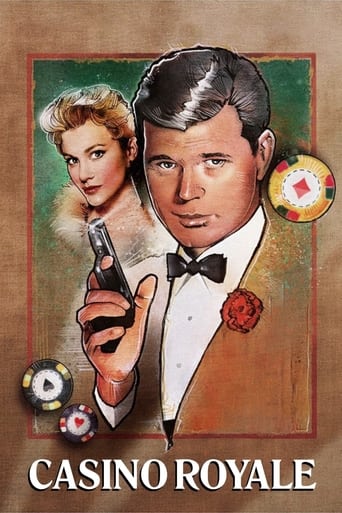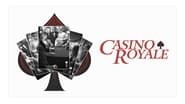Zbigniew_Krycsiwiki
Early TV movie adaptation of 'Casino Royale' has the low key feeling of the original novel. The low budget both helps the movie and hinders it: it gives it the grittier look that some of the Bond novels have, and also makes it look slightly like a film noir, but also limits it in term of sets and props and lighting (which is often times visible over the actors' heads.) The short run time is also a mixed bag: the film doesn't overstay its welcome, and follows the book fairly closely, (the original novel was so short that it seems almost like a pamphlet, rather than a full length novel) but it doesn't give much opportunity to flesh out the characters at all.Peter Lorre is good as LeChiffre, and Michael Pate as Leiter (or "Letter" as he's listed in the end credits) is very likable, and perhaps would have made a better choice to play Bond here, but Barry Nelson was mediocre. If he would have been more familiar with the character and not been doing a Humphrey Bogart impersonation, he might have been good. He does fairly well when he's intensely grilling Valerie Mathis about the microphone LeChiffre planted in Bond's room, and he's adequate in the casino sequences, but falls flat during the climactic scenes.This TV-movie is also marred by the fact that the love interest between Bond and the lead girl is almost completely overlooked here, as is Bond's contemplation of resignation and his subsequent double-cross by the girl; basically the entire fourth(!) act of the novel was omitted here. Maybe if it would have had a longer running time, and if the censors would have allowed it, they could have fleshed out some of these omitted story elements? One of the villain's henchmen has a cane which doubles as a gun, which is a good touch; this particular scene follows the book closely, and is one of the better scenes in this film.
ingemar-4
This very first Bond movie was made with no preconceptions about Bond and not much respect for Fleming's novels, which is why the story is in some ways badly butchered. The ending is dull and plain compared to the exciting double endings of the original story. Some scenes, like the opening assassination attempt, are clumsy, badly acted.Of course, making Bond American and Leiter English seems awfully stupid for us, but this was made for a pure American audience, so they just translated the story from a British spy story to an American one. Doing that in the 50's is more excusable than making Bond look like an eastern Europe gangster in the 2000's.A particularly interesting comparison between this and the 2006 movie is Le Chiffre. Is it possible that Mikkelsen was chosen simply because he looks very much like Peter Lorre? The similarity is striking. Mikkelsen is taller and slimmer, but put their portraits side by side and they almost look like the same person. And in both movies, they carry the best part. Both stand out as the character actor of the movie!All in all, I claim that a good Casino Royale movie is still to be made, one that takes the original story seriously and does it well. The 1967 version is by far worst, but all three are embarrassing. This one is just the least embarrassing of the three.
A_Friend_of_Sarah_Connor
While 1962's "Dr. No" was the first time James Bond appeared on movie screens, it was actually this 1954 television adaptation that the character was first seen at all. Since this was on American television, though, Bond's nationality was changed so he became Jimmy Bond, a Yank. Besides this distracting update, the story is very close to Ian Fleming's novel and most of the scenes are lifted directly from their source.A banker for SMERSH, Le Chiffre (played by Peter Lorre) has lost precious funds and has turned to a game of Baccarat to win it back. Bond is ordered to beat Le Chiffre so that his bosses would eliminate their own agent, causing great embarrassment to the organization. Helping Bond is Brit Clarence Leiter (another change from the novel) and Valerie Mathis, a former lover.It's fairly obvious that this was a live made-for-TV movie, with some technical screw-ups showing up here and there and the lack of a lot of different sets. That being said, the hour long episode moves quickly, with Baccarat being explained for anyone who doesn't understand at the start. There are also some funny bits, such as when Leiter manages to keep money away from one of Le Chiffre's henchmen.The small cast works well together, even though the acting gets appropriately too theatrical at times for my taste. Lorre is chilling as Le Chiffre, and fits Fleming's description quite nicely. Michael Pate as Leiter is pretty solid and a believable ally, while Linda Christian is the only weak link in the chain. So what's the verdict on Barry Nelson, the first James Bond? He's definitely no Sean Connery, but handles himself well before the image of the secret agent was created in the film series. His relaxed attitude helps to distract from the fact that Bond isn't British here.So even though the ending is a bit too tame (Fleming's torture from the book would never have reached TV audiences from 1954), the mini-movie makes up for it with a tense battle at the card table, some good acting, and a great espionage feel throughout. Any Bond fan should at least try to find this and the average movie goer should do the same, just to see how James Bond's first mission played out. 7/10
Ben Burgraff (cariart)
When Ian Fleming published the first 007 novel, "Casino Royale", in 1952, he envisioned it as being made as a movie, and began 'selling' it to anyone who might be interested. He quickly struck a deal, but soon discovered that he'd made a bad bargain; once he'd relinquished the rights, not only did he lose any control over how it would be used, or where, but on any potential revenue from it, as well. He'd be far more cautious in future, but "Casino Royale" became the one 'Bond' title that Eon Productions wouldn't own...giving it a convoluted history that is worth a book on it's own! American television, in the 1950s, was called the "Golden Age" of 'live' drama, in part because recording techniques were so primitive. Short of actually filming productions, which was costly and time-consuming, the only way of recording was on videotape's predecessor, which was grainy, dark, and really awful. As a result, much would be performed 'live', with the taping only made as a record of the airing.A lot of plays, stories, and novels were edited into half-hour and hour-long television programs, and "Casino Royale" was adapted, by Charles Bennett and Anthony Ellis, for an episode of the "Climax!" TV series. Changing sophisticated British spy James Bond into American CIA operative "Card-Sense Jimmy Bond", the characters were toned (and in some cases DUMBED) down for American audiences (I think the writers thought the Yank idea of 'sophistication' was beer in a glass). Vesper Lynd became Valerie Mathis, CIA agent Felix Leiter became British agent Clarence(?) Leiter, etc. The villain's name remained 'Le Chiffre', although his method of torture (caning one's genitals in an open-seated rattan chair) was 'cleaned up'...As Bond, veteran American actor Barry Nelson was smug, confident, and independent, preferring a 'lone hand' to outside interference. I met Nelson in the early 1990s, and asked if he remembered the production. He said he recalled little of it (as the production was 'live' and he was very busy in a variety of projects), but that, he recalled, Peter Lorre, as Le Chiffre, had trouble remembering his lines, and ad-libbed a lot.Within television's limitations, the basic plot (of Bond beating an enemy agent at the gambling tables to prevent him from recouping 'lost' espionage funds) is pretty faithful to the novel (which was based on Fleming's own wartime experiences). Despite this, the production is stagy (with only two sets), rife with missed cues and flubs, and overripe performances. Lorre does make a good villain, however, certainly better than some of the later film ones! All in all, the production offers novelty value, and little else...




